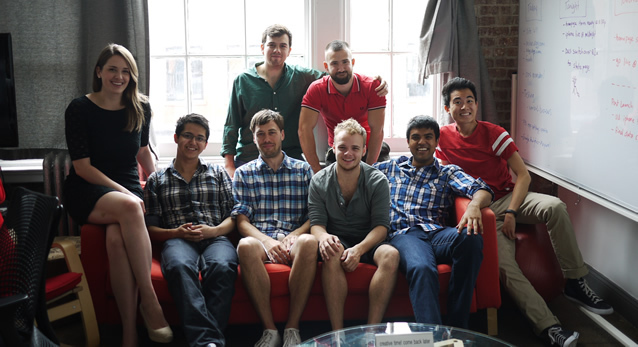Is Branch too smart?
Adam Rifkin stashed this in Branch

Source: Branch Bulletin
Stashed in: Conversations, Lolcats!, The Web, Reddit!, Best PandaWhale Posts, Blogs!, Attention, Quora!, Dancing!, Awesome, gifs, Conversation Design, tl;dr
Branch came out of private Beta today.
I like that, like blog posts, branches are public, so they contribute to The Open Web.
But my main challenge with Branch is this: Branch feels like work.
I clicked on all of the links from today's announcement...
We built Branch with you -- all of you -- in mind. We want it to be a place for you to talk about all the things that are happening in your world. So far, our team has used it to talk about rap music, swap travel ideas, discuss the presidential election, explore a new neighborhood, ask for advice on iOS design, and reminisce about our favorite childhood technologies.
...and found my eyes glazed over while trying to read every single branch.
Has Twitter ruined me?
Or is Branch too smart?
Because all I can think as I try to read is tl;dr...
Adam,
I think this is a really interesting discussion thread that picks up on something we've discussed before and ways in which this intertwines with PandaWhale's approach. I feel for the guys as I like their objective as described in the video, but I have to agree with your key insight that "it feels like work." Ouch "TL;DR" ack! It also feels a little like Google+ with the circle thingy.
I'm going to give 'em a little more of a chance, because I really like the goal (and their thumbing the finger at Facebook in the video.)
I'm sort of fascinated by the way that some of the most modest interfaces continue to capture attention for "conversations" by being extremely focused by topic. Consider, for example, backyardchickens.com or the dozens of special interest blogs around hayabusa motocycles, BMWs, tattoos, etc. (Yeah, I have wide ranging interests.)
Feels like it needs its own stash but I'm not sure what to call this category.
I'm not sure what to call it, either.
It's VERY Google+ with the circle thingy.
I can appreciate how hard it is to build a great conversation system.
I do hope they succeed.
The Open Web needs more great services.
I feel very differently. Thank god for sites that feel like work.
My Facebook feed is flooded with silly mindless crap and Twitter gives me more useless intellectual trivia than I can ever consume.
To regain my strength, I have to flee to The New Yorker, The Atlantic, The Economist or one of the few other online magazines that does not find it necessary to put a celebrity on the cover. More often than not I just go back to the Kindle app and read books.
There's a place for silly crap and meaningless trivia. What I'm disappointed about is increasingly that place seems to be "everywhere."
Ok, so did you click on any of the Branch links and find a conversation you wanted to read?
I agree that the Malcolm Gladwell, the Paul Krugman, and the Atlantic style makes for good reading but those are exceptional, single-voice, and most importantly, edited.
The presidential election branch was good but I see your point. With anything crowdsourced it's all about the community in both content and editing.
We'll see if Branch can walk the tightrope between staying smart and staying alive. I think that's the challenge. Quora has done it pretty well but Quora still feels very contained.
Becoming Reddit is clearly not their goal but what Reddit may lack in couth it makes up for in terms of a rabidly loyal community and it definitely has an identity and a voice.
Reddit thrives because (in the best threads) the comments are better than the source material. It truly is a jumping off point like the question that begins a debate. Nobody would ever say tl;dr about a great Reddit thread because the comments are the gold and it really is the journey over the destination. You can only say tl;dr where you expect a clear answer or conclusion.
But, as you indicate, without professional Gladwells and great editors, a site is all about its community and culture. Reddit (whatever one may think of that community/culture) has one and has thrived. I can't say I disagree with you about Branch and what this augurs for its future.
Anyone else have thoughts on this?
I do, actually.
You reminded me that in 2005 through 2008 Reddit felt like a ghost town.
It was small and filled with nasty spectres and apparitions that kept a lot of people away.
Feels like it started growing in 2009-2010 and really exploded in the last two years.
What this says to me is that a good website needs time to grow.
That was certainly true for WordPress, Twitter, and Tumblr. They all needed time.
Perhaps that's what Quora and Branch need, too.
When I read, I'm looking for either recency or quality. There's a saying that day-old newspaper is used to line birdcages.
I read online content with the expectation of learning the latest, and I accept the lower quality as a necessary by-product of speed.
I read books with the expectation of reading a well-thought-out, carefully-edited piece with lasting, perhaps eternal value. I accept that the data won't be up to the minute, but I count on the essential timelessness of human nature.
Chris,
As one who historically saved NYTimes and New Yorker articles (at least till I was confident I could get them all online), I would argue that there is a place for longer thought pieces that are topical, more so than you'd find in printed books, even if they're at risk for the bird cage.
The topic that I think Branch brings up is the role of conversation. Obviously a topic near and dear to all of us taking the time to participate in PandaWhale.
I would postulate that the biggest challenge for Branch is that they're attempting to trigger that conversation across all subjects. Join and find a subject. Find a community.
For conversations that are deeper than "like" or "cool," you need a shared community first. Blogs have been effective at doing this by bringing the articles first. Google+ sort of does this by letting people bring their own communities share the articles then trigger discussions. Quora did this by focusing first in the startup world. There's a certain "gotta be there" that happens within some communities.
Conversations are happening, it seems to me in a wide range of topical areas today. Academics are probably out there studying the phenomenon, but I think they all begin with a given community. The tools to trigger the conversation aren't the problem. Look at the a range of categories they grow around:
-blog-based communities (avc.com comes to mind)
- Q/A-based communities (Quora)
- old-school Fora (I suggested backyardchickens.com, or bodymod.org, but there are dozens more living lives of conversation on horrid interfaces), and this new
- review-based communities (Yelp)
I can't get passed the misogynistic attitudes over at Reddit, but there's probably a separate category for that too.
Seems to me that conversations grow around communities of people who share something and the conversation starter is triggered by something topical. (To your point, Chris.)
Language, topic, age/life stage, all sorts of things define a community. I think that's part of why Reddit woke back up again, and will not easily shake it's attitudes. That's part of what makes it work. It's not for me, but if it were, it wouldn't work as well as it does. (Mom knows when to leave the boys alone.)
Tools, UI, are just stuff that makes the conversation more or less convenient on our Internet today. Can be crude, but acceptable if the conversation is good. Ever try to have a conversation on a train. It can work, but it can also be tough.
We've been talking about verbal communities. Perhaps music and photo sites are accomplishing this as well, though in different forms.
Thoughts?
I love discussing great ideas with smart people. I like hearing other impressions and having people contribute their knowledge and experience.
Facebook is just not that cerebral and deliberately so. Twitter tries to be intellectual but 140 characters as a design choice tells you it wasn't built for it. Google+ has potential but still lacks a critical mass of regular users.
For most sites it's very much about the individual culture created by the dominant members of the community, what they stand for and what they will police as the forum's "immune system."
Well, that's kind of what I'm getting at.
I agree with you there Facebook and Twitter's design choices confirm they're not designed for it and don't want it.
Google+ is interesting because I think the design works, the difference is more than "critical mass." I think it's culture and focus on given communities. By allowing each user to define their own circles, it's still more of an observation deck for most people. There's no sense of obligation to participate, little clarity about what the topic is.
Here even if the topics wander around to different stashes, the community defines the context. We all love da kitteh, but there are certain commonalities around startups, the bay area and other shared experiences that lead to a useful conversation built on trust.
I don't really know you all, but I'm getting a good sense of you and, frankly, look forward to meeting you in person. I'm going to guess that at least some of you are regulars at Adam's 106 Miles events. Look forward to sharing a beer and putting a face to the name for context. Cheers.
Barbara, although PandaWhale started with some 106 Miles people it's gotten much bigger than that.
Google+ has a critical mass of users but any given user might be disconnected from them.
Connecting all the users by their interests is a hard problem.
But it's a problem worth working on.
What blog communities (and PandaWhale for that matter) prove is that it doesn't take a large community to deliver a great experience.
If I had to, I'd try to come up with a formula that read something like this:
Experience = f(critical mass of >5 comments/item) * f(quality of commenter) * f(focus of site).
The number of uses is necessary but not sufficient; this is why Quora has languished a bit--as the number of users rose, quality and focus declined. Reddit has been able to maintain its focus by dint of its very peculiar community.
Yep. That says it nicely.
So hopefully PandaWhale can maintain a peculiar community (like Reddit).
Instead of a quality- and focus-declining community (like Quora).
Yep. That's the awesome sauce that makes the dish. I'm not quite sure how to wrok that into Chris' formula:
Great Experience = f(critical mass of >5 comments/item) * f(quality of commenter) * f(focus of site).
Perhaps there's some added *f(awesome sauce) that makes it remarkable (Seth Godin), interesting or just quirky enough in that familiar way to bring you back.
Thanks for the welcome mat, by the way. I was kinda turned away by the big red NO sign over at the Reddit door.
Yes, but google Facebook or twitter will acquihire them for the team, no? http://pandawhale.com/convo/4573/the-lawyers-look-at-the-aqui-hires-uncrunched
This team has no desire to be acqui-hired.
They're likely to announce a venture capital round soon.














5:36 PM Aug 13 2012